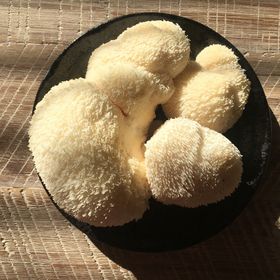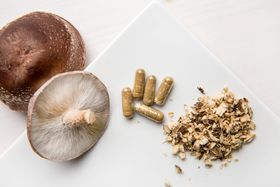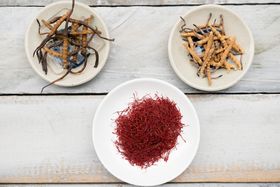The Potential Health Benefits of Lion’s Mane Mushrooms
Updated April 7, 2023.

Traditional alternative medicines have generally been frowned upon by western culture. However, they seem to be gaining prevalence in recent years, with more research delving into their potential benefits and more doctors recommending them. Among these is a medicinal mushroom called Lion's Mane (Hericium erinaceus), gaining its name from its fluffy appearance that resembles a lion's mane.
But, how effective are these mushrooms, and what potential benefits do they present?
» Find the perfect mushroom blend for your condition - take free quiz
Lion’s Mane May Improve Cognitive Health
One of the most prominent claims made by supporters of Lion's Mane mushrooms is that they can improve brain health through a process called neurogenesis, which is the forming of new neurons in the brain. This claim is then extended to the belief that Lion's Mane mushrooms can help with memory conditions like dementia and Alzheimer's.
One study seems to support this claim after it found that participants who took powdered Lion's Mane extract for 16 weeks had improved cognitive functioning. Although this doesn't necessarily mean that Lion's Mane will make you smarter, the evidence could suggest that this alternative medicine might help protect against cognitive impairment disorders like epilepsy.
Another potential benefit to Lion's Mane and neurogenesis is alleviating ALS symptoms due to nerve system repair.
Lion’s Mane May Have Anti-Inflammatory and Antioxidant Properties
Another prominent benefit of Lion's Mane mushrooms is that they can reduce oxidative stress and inflammation throughout the body. This study found that these mushrooms exhibit strong antioxidant activity.
Additionally, another study found that Lion's Mane may exhibit anti-inflammatory properties.
The primary benefits of reducing inflammation and oxidative stress could be improvements to heart health and blood-sugar regulation that will benefit cardiovascular diseases and diabetes. Additionally, many other conditions that are exacerbated by inflammation, such as psoriasis, could find some relief through Lion's Mane.
Lion’s Mane May Improve Mood-Related Disorders
One of the major talking points of Lion's Mane mushrooms is using them for better sleep. It's not a stretch to suggest that Lion's Mane can assist with insomnia due to 2 main reasons:
- Lion's Mane exhibits an energising effect that helps with fatigue, leading to better management of your circadian rhythm if taken in the morning, and easier sleep in the evening.
- The antioxidative and anti-inflammatory properties listed above help your body fall asleep easier due to an overall increase in wellbeing.
» Take a look at our Lion's Mane infused Beauty Sleep Drops
Aside from the benefits to sleep, Lion's Mane can also potentially assist in other mood-related disorders like anxiety and depression. Although it may not treat the condition directly like antidepressants and anxiolytics do, inflammation could be a major contributor to symptoms of these disorders.
» Give yourself a lift-me-up with Cannabotech's Relax Drops
As well as these, Lion's Mane may also impact symptoms of autism. Although there is no scientific evidence on humans to support this belief, it could be extrapolated that the antioxidant and anti-inflammatory properties of Lion's Mane could benefit symptoms of autism. Additionally, the neurogenerative properties of Lion's Mane might help with symptoms of tinnitus.
Lion’s Mane May Have Immune Boosting Properties
Stimulates Immunomodulating Activity
Multiple studies have pointed to the benefits of Lion's Mane on gut health as the mushroom stimulates immunomodulating activity within the gut. Considering that around 80% of the immune system is located in the gut, it's no stretch to believe that Lion's Mane can significantly benefit the body's immune response to a variety of diseases holistically in combination with its anti-inflammatory and antioxidative properties.
Inhibits the Overgrowth of H. pylori
Additionally, Lion's Mane also inhibits the overgrowth of a bacteria called H. pylori that can cause ulcers in the digestive tract and protect the stomach lining from damage often caused by many anti-inflammatory pharmaceutical drugs. Although the bacterial inhibition was only performed in vitro, the results are still promising.
Lion’s Mane May Protect Against Cancer
Although this claim has never been directly tested in humans, some studies found that Lion's Mane extracts exhibited anti-tumour properties that inhibited the potential for cancer cells to spread and cause them to die faster than usual.
In conjunction with the benefits presented to the immune system, this direct effect and the reduction in oxidative stress amounts to an overall increase in cancer protection.
Is Lion's Mane Worth the Risk?
Despite the number of potential benefits you might experience from Lion's Mane, there is an incredibly low reported risk of side effects. Although no studies have looked directly into the side effects experienced long-term in humans, there isn't any evidence that it could cause harm, even when researchers administered high doses in rats over an extended period of time.
Although this isn't to say that you definitely won't experience any adverse reactions. Everyone's different, and you could experience minor to moderate side effects, especially if you have a mushroom allergy. If you do have any concerns, you can get more insight into your own personal predisposition to adverse reactions via mushrooms by chatting to your doctor.







